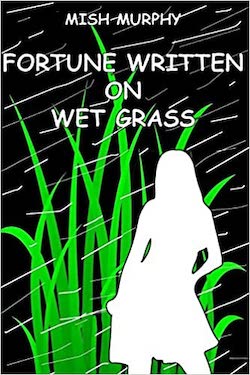Florida—not the tourist’s Florida of palm-lined beaches and theme parks, but a rural landscape of hot rain, rolling thunder, and riotous plants and animals, both gorgeous and grotesque—is the great subject of Eileen “Mish” Murphy’s first full-length poetry collection, Fortune Written on Wet Grass.
Murphy grew up in west Florida and lives there now, teaching English and literature at Polk State College. Her poems swim in a thick atmosphere of tropical isolation and menace. In “The Rain Has Lost Its Mind,” Murphy’s intense first-person female speaker is mesmerized by the fury of a Florida storm:
…Rain begins to fall on the orange groves,
fingers tapping hollow walls.
Suddenly, the rain loses its mind.
Fireflies explode in the night.
Elephants trample the clouds.
Nature flaunts an edge of danger in many of these beautifully compressed lyrics. In the prose poem “Mangos,” the speaker asserts:
…If a certain spider bites your finger when you’re
picking a bunch of bananas from the tree, you have to
cut your finger off with a machete. Otherwise you die.
In “Gestural Shape of a Woman,” rain—Murphy’s recurring “fortune written on wet grass”—haunts the speaker in a violent dream:
Rain pelting the window
as a woman dreams
is like thrown gravel
or bullets.
A cobra strikes.
Humans also make appearances in Murphy’s deceptive paradise. In “Catnip,” a longer narrative poem that still displays Murphy’s short, sharp line breaks, the speaker humorously traces the downfall of a relationship in the decay of her fiancé’s sadly ambitious garden:
…It’s hot here in Florida.
It’s terrible hot.
He put up
this shade contraption,
wooden slats,
a kind of jail for herbs.
…
The thyme soon ran out of time.
Poor little dill
keeled over
like wilted asparagus stalks.
Rosemary and sage
never grew enough
to save.
At the end of this story, only mint (“a weed”) and the hardy catnip survive. The solitary—though not lonely—speaker concludes with wry observations on the habits of cats and men:
…One by one,
the feral cats in our rural neighborhood
strut around and around
the abandoned herb garden
on hot summer nights.
They perch
on a shade-slat amid the weeds
and begin
to howl.
And in “The Stargazer” (something of a contemporary woman’s take on Whitman’s “When I Heard the Learn’d Astronomer”), the speaker passes judgment on a male friend who is obsessed with the night sky to the exclusion of the present moment:
…He travels
thousands of miles
to see eclipses
through funny glasses,
but he never looks down
to see
the earth
under his own
flip-flopped feet.
Conversely, in the exquisitely detailed “Caterpillar,” she achieves Zen-like clarity in tracing the slow but confident—almost triumphant—progress of one single insect:
A caterpillar crossed
my sidewalk route,
green
as lime
Kool-Aid,
plump
as a balloon,
galumphing along
like a Chinese dragon…
Murphy also is an artist and illustrator who often paints dogs, both realistic and fanciful. In “Beef Tips,” the speaker portrays this enduring human-canine connection with sure and vivid verbal strokes and a primitive relish:
I love to stick my hand
in my dog’s mouth—
…
with dripping left-over beef tips and gravy from
Publix
on my fingertips—
…
he licks me clean
with his greedy carpe diem tongue.
The poems in Eileen Murphy’s enchanting first collection both embrace and transcend regionalism, seizing the day as surely as does the poet’s dog in “Beef Tips.” Murphy deftly mixes desire with memory—defining home as the place where one finds oneself, to discover the terror and delight that lurks around every corner.
In the final poem of Fortune Written on Wet Grass, “I Wish,” the speaker travels back to childhood and the modest but wholly (and holy) cherished gifts of her long-dead grandmother:
Grandma,
I wish
we could sit down
at your Formica table
in your kitchen in Tampa
and eat grapes
and drink Cokes from the bottle
to keep cool.
…
I wish I could
wrap you
into a piece of bread
and carry you in my purse
and when I needed you,
I’d pull off a piece
and let you
dissolve
on my tongue.
Fortune Written on Wet Grass
by Eileen “Mish” Murphy
Paperback: 50 pages
Publisher: The Wapshott Press (2019)
Language: English
ISBN: 2688–853X
ISBN–13: 978–1–942007–31–9

